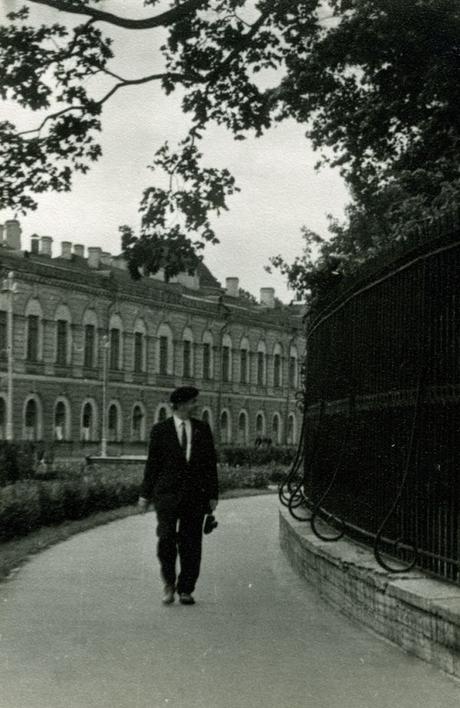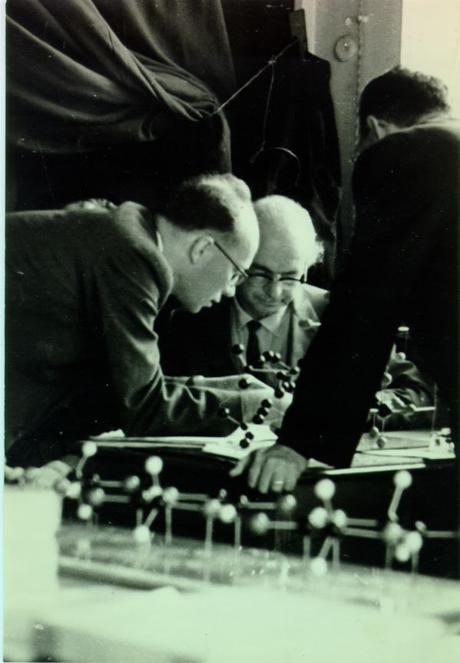
[Ed Note: We conclude our posting schedule for 2019 with this look at a controversy from sixty-two years ago. See you again in January!]
Linus Pauling’s largely congenial relationship with Soviet scientists had always been motivated by a desire to foster academic exchange between the two world’s two superpowers. Pauling first visited the USSR in Summer 1957, and as soon as he returned home, he expressed an eagerness to continue collaborating with his Soviet peers.
Perhaps most notably, Pauling extended an offer to Academician V.N. Orekhovitch to come to Caltech and deliver a guest lecture on procollagen, which was Orekhovitch’s subject of expertise. To pave the way for this visit, Pauling offered an honorarium of $250, which was a large sum in absolute terms but especially so for Soviets, for whom “hard currency” like U.S. dollars had tremendous spending power.
Orekhovitch readily accepted this offer and the two initiated the process of securing a travel visa through the usual State Department channels. However, in November 1957, Pauling received an urgent telegram from Orekhovitch in which he stated that he was unable to obtain travel papers and that he desperately needed Pauling’s help.
 Pauling in Leningrad, 1957
Pauling in Leningrad, 1957When Pauling received the telegram he immediately began to work towards understanding why the visa had been denied. One clue was a recent article that he had read that hinted that Pasadena – among other cities – had been declared to be off-limits for Soviet travelers. However, he was not certain of this information, or that this was the reason for Orekhovitch’s denial.
In search of answers, Pauling contacted multiple colleagues across the country asking whether or not they had encountered similar difficulties. Paul Doty, of Harvard University, replied that he had recently become aware that travel by Soviets was not permitted to the entire state of Massachusetts except for Cambridge, where Harvard was located. This bit of information seemed to confirm that Pauling’s initial fears were indeed true: the State Department had established certain areas of the United States as off-limits for Soviet visitors.
Despite this, Pauling was determined to get his Soviet colleague a visa. In December 1957, a month after having first received Orekhovitch’s desperate telegram, Pauling spoke to a State Department official, Lawrence Mitchell, who confirmed that Pasadena, San Francisco, and much of Los Angeles were forbidden for Soviet visitors. Speaking over the phone, Mitchell explained to Pauling that Pasadena had been put on the list specifically to exclude travel to Caltech – an important point that would be contradicted in later exchanges.
Mitchell also made it clear that the State Department did not intend to lift the restriction anytime soon. Nor could Mitchell grant exceptions for specific individuals, because then Soviet travel restrictions “would have little effect in applying pressure on the Russian government.” In effect, this meant that the State Department had barred travel to Pasadena for larger political aims.
For Pauling, the ramifications of this policy were unacceptable. In his view, the refusal of Orekhovitch’s visa was not just a matter of a single person being denied the right to travel, but was actually representative of a much larger problem: the stifling of US-Soviet scientific collaboration.
In the wake of his phone call with Lawrence Mitchell, Pauling set out to express his disapproval in a more formal way. In a December letter to Detlev Bronk, Pauling made clear his perspective, noting that
I feel most strongly about this issue matter because I think that it gives the Russian scientists who come to the United States a false impression –the impression that we are a police state, where scientists are not free to talk with other scientists, but are ruled by the Department of State. This surely is bad propaganda.
That same day, Pauling wrote a parallel letter to the State Department in which he outlined his frustration with the decision to deny Orekhovitch a visa. In this communication, Pauling emphasized the potential for loss of scientific progress, noting specifically that Orekhovitch’s “inability to come to Pasadena has prevented the scientists here from getting information that would be of value to them.” Further, he felt “strongly that it is wrong for the United States to give visiting scientists the impression that work in fundamental science is not conducted freely in our universities and research laboratories.” Simply stated, “the policy that has permitted this action to be taken seems to me to be one that clearly does harm to the United States of America.”
Importantly, Pauling was likewise bothered by a nagging feeling that Pasadena’s inclusion on the list of banned cities was directed specifically at him. In his letter to the State Department he couched this by writing in “protest against the discriminatory action” where Soviets were allowed to visit Harvard or UC-Berkeley, but not Caltech. A Harvard colleague echoed Pauling’s feelings, describing the situation as “embarrassing and frustrating” in his own letter to the State Department.
 Pauling examining molecular models with Soviet scientists, 1957
Pauling examining molecular models with Soviet scientists, 1957The government’s response to these complaints was, for Pauling, far short of satisfactory. In its reply, and in contradiction to Lawrence Mitchell, the State Department explained that Pasadena was deemed to be a strategic city because of its geographic location; that Caltech was off-limits simply because it was a part of Pasadena; and that all Soviets, not just scientists, were excluded from traveling to the city.
The letter did not clarify why Pasadena’s location made it a strategic city, nor did it provide any indication as to why Berkeley or Cambridge were not geographically strategic. Rather, the suggestion was merely that Orekhovitch had been denied a visa as a matter of routine and that the ban on travel to Pasadena was logical due to the implied importance of the city.
After this initial exchange, several letters were sent back and forth between Pauling and the State Department. In them, Pauling continued to criticize what he believed to be an arbitrary decision, and the State Department adamantly defended its position that Pasadena was a strategically important city that must remain off-limits. In these exchanges, both the State Department and Pauling increasingly became focused on establishing that they were in the right, to the point where tangential details that were not germane to the main issue began to assume a place of primacy.
In one example letter, an official from the State Department wrote that he had reason to believe that Pauling had called the Soviet Ambassador to the United States, Georgy Zarubin, and asked him to work on granting Orekhovitch a visa to visit Pasadena. Pauling, not wanting incorrect information to go unchecked, indicated that he had at no point ever contacted Zarubin or any other representative of the Soviet Union. In all subsequent letters, Pauling always included this piece of information, and the State Department continued to reply in kind. Petty behavior of this sort came to permeate much of the communication between the two parties during this time.
Sadly for Pauling, the issue was never resolved. Near the end of 1958, more than a year after initially extending his invitation, Pauling sent Orekhovitch another letter asking him to come to Pasadena as soon as the visa restrictions were lifted. Perhaps understanding that this opportunity might never actually come to fruition, Orekhovitch chose not to address the issue in his reply, instead wishing Pauling a happy new year and sending his best regards to Ava Helen. That letter appears to have marked the end of their professional correspondence and Orekhovitch does not seem to have ever made it to Pasadena.
